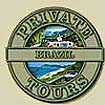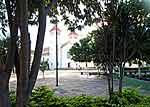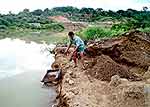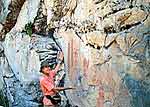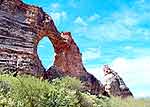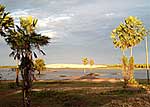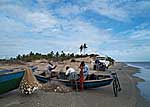GENERAL
INFORMATION |
||
|
||
| |
![]()
| Capivara and Sete Cidades National Parks, Parnaíba Delta, Tutóia and Lençóis Maranhenses | |||||||||||||||||||
| This
trip can originate from either Salvador or Recife.
World renowned both capitals offer plenty of touring options that
are explained in many travel guidebooks. Recife, Olinda,
Igarassú, the Orange
Fort and the "Peixe
Boi" project should be included in your
plans along with a visit to the Brennand
ceramic plant. The adventure starts in Fortaleza
from where we leave for Piri Piri by crossing the arid areas of
Ceará State. The Capivara National Park and the "Museu
do Homem Americano" created by Niède
Guidon after many years of efforts to preserve and protect many
pre-historical sites, will impress you. From São Raimundo
Nonato we leave for Parnaíba, the city base to explore (1)
the only delta in open ocean waters in the Americas, and (2) the
Lençóis Maranhenses, the only desert in the world
that contains hundreds of crystal clear lakes. The crossing from
Tutóia to Barreirinhas with a 4x4 Toyota along the shore
and with an experienced local driver-guide is an experience of a
lifetime. From Barreirinhas it is a 280 km drive to São Luis,
the TILE and Reggae capital of Brazil. Its Historical
Center ("Reviver" Project ) at night
offers such a variety of scenes that are hard to imagine, but wonderful
to experience. Alcântara, and São José de Ribamar
are two destinations that you should also visit. The road São
Luis -Tutóia should not
be driven at night and with daylight offers
scenic vistas. |
|||||||||||||||||||
|
|
||||||||||||||||||
| Piri
Piri Piri Piri, is the base for the exploration of the Sete Cidades National Park and its pre-historic paintings. It is only about 450 km from Fortaleza and 180 from Teresina, the Capital of Piauí State. Interesting geologic formations are everywhere. We can explore the Park by rented bicycles.(A local guide is mandatory). |
Pedro
II
Pedro II, the capital of opal mining in Brazil, is about 50 km from Piri Piri. Gems are mined locally and sold directly to the public by many jewelers in the area. Most of the production is exported or shipped to dealers. It is not a place to overnight. Mining areas normally are not safe for foreigners, but can be visited with an experienced guide. |
||||||||||||||||||
|
|
||||||||||||||||||
| Sete
Cidades National Park The Sete Cidades Park can be reached with the IBAMA bus. We recommend walking or biking to the main attractions: The Turtle Stone, the Library, petrified trunks and the many well-preserved rock inscriptions. Bizarre rock formations can make you develop your own theory they formed. |
Capivara
National Park The small town of São Raimundo Nonato will serve as a good base for day trips. This is the headquarters of Dr. Niède Guidon. Here she researches and develops her projects. More than 535 pre-historic sites and 30.000 paintings are catalogued, just to give you an idea of the size and importance of this area. Most of the sites are for research only and are not open for the public. |
||||||||||||||||||
|
|
||||||||||||||||||
|
Parnaiba
Delta The most spectacular way to know this area is to start at Parnaíba, the second biggest city of Piauí State, find a good place to lodge and visit the Historical Center. Production of Carnaúba wax was historically the main economic activity. A private boat tour along the Parnaíba River will show you dunes, rice plantations, and mangrove swamps that often contain Boa Constrictors and Iguanas. It is a crab sanctuary as well and you can try to catch one |
Tutoia
and Lençois From Tutóia we can take a catamaran and sail to the Coral heads, where we can scuba dive and see where Lithothamnium sp, is mined and eventually see dolphins. Tutóia has some excellent seafood restaurants and is our base to plan a sometimes strenuous drive to Caburé and there on to Barreirinhas by boat. The dunes along the way need a good pilot, driver, and guide; otherwise you may have to abandon the vehicle to the dunes. July to October is the best time to go there. |
||||||||||||||||||
Pedro Novak - Private Tours - Rio de Janeiro
